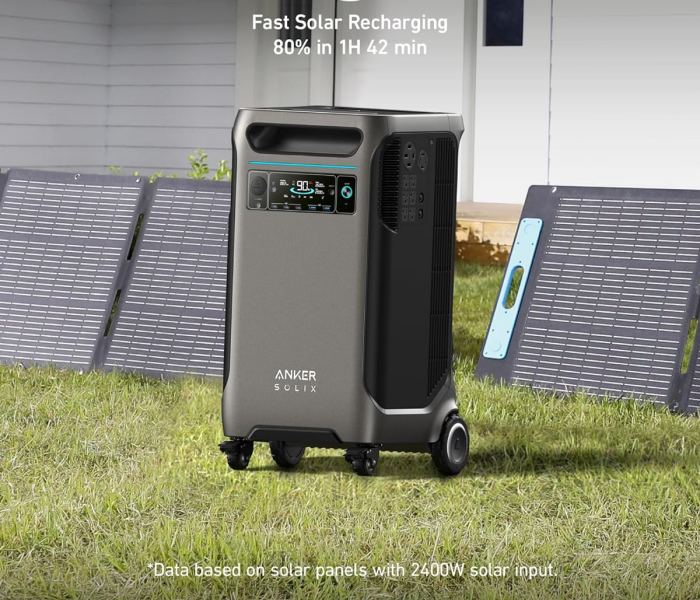
How Many Watts Does a Crock Pot Use?
Crock pots, also called slow cookers, are one of the popular kitchen appliances. They provide a convenient way to simply cook soups, stews, roasts, and a variety of other dishes at low temperatures. In this way, food can be cooked at relatively low, mild temperatures for up to several hours without the risk of boiling over.
This article will introduce how many watts dose a crock pot use and find out the factors that affect its energy consumption, such as cooking temperature, pot size, and usage frequency. Additionally, we'll provide insights on how to power your crock pot during off-grid adventures like camping trips. If you are interested in it, keep reading to learn more!

What Does Wattage Mean for Crock Pot?
Wattage is a unit of measurement, which represents the amount of electricity consumed by the crock pot while it is running. A higher wattage means that it will heat up faster and thus shorten the cooking time. However, this does not necessarily translate to better cooking results, as slow cooking relies on low and steady heat and a crock pot with the appropriate wattage will not cause circuit problems.
Typical Wattage for Crock Pot
The typical wattage for a crock pot is between 200 and 300 watts. This will change depending on its capacity, a small 2 to 4-quart crock pot will mostly be in the 100 to 200-watt range, while a 6 to 8-quart will be in the 200 to 400-watt range for most family uses, and a 10-quart crock pot will use over 450 watts. Larger capacity crock pots may have additional features such as locking lids, spill-proof accessories, and smaller basic models tend to only have low/high temperature settings. So if you're looking for a model with lots of features, be prepared that it will consume more energy than a basic crock pot.
Factors Influencing the Crock Pot Energy Consumption
Cooking Temperature
Higher temperatures consume more energy, so we recommend that you use the low to medium-temperature mode to reduce energy loss.
Size of the Crock Pot
Crock pot size has a significant impact on energy consumption, the larger the size the higher the wattage of the crock pot. For the same usage time, a larger size crock pot will consume more energy than a smaller one.
Frequency and Duration of Use
The frequency and duration of use also affect the energy consumption of a crock pot. The more often and the longer it is used, the more energy is consumed. Proper sizing and cooking time can help to effectively conserve the amount of electricity consumed by the crock pot.
How to Power a Crock Pot during a Camping Trip?

Whether you're an adventurous camper or an RVer, enjoying a hot, homemade meal outdoors is certainly appealing. But how do you power a trusty crock pot without a traditional electrical outlet? This is where the utility of a dependable portable power station comes into play, offering the ease of preparing meals in the wilderness.
The Anker SOLIX F3800 Portable Power Station is a powerful power solution for outdoor use or as a home emergency power source that will revolutionize outdoor cooking. The unit has a capacity of 3.84 kWh, which is able to run a maximum wattage crock pot for several hours. Moreover, the 120V/240V dual voltage design and up to 6,000 watts of output power a wide range of appliances. You can power not only the crock pot, but other high-voltage appliances and electronics as well, making it the perfect companion for extended camping adventures.
Enhancing this setup, the power station can be paired with the Anker SOLIX F3800 Solar Generator, leveraging solar power to extend the duration of your culinary endeavors. The solar generator's design is versatile, with the ability to adjust to three positions for optimal sunlight absorption, and it's both foldable and lightweight for easy transportation. Its IP67 waterproof rating ensures it can offer effective solar charging in various settings and under different weather conditions.
The setup of solar generators and portable power stations allows for the luxury of preparing a variety of fresh vegetable dishes or tender meat stews under the sun every day, offering a delightful alternative to the repetitive menu of hot dogs or chips typically associated with camping.
Conclusion
By now, we have known how many watts does a crock pot use, typical wattage will be between 200 and 300 watts and will vary depending on the size. If Optimizing energy consumption during use requires choosing the right size, temperature setting, and method of use. For outdoor enthusiasts who want to enjoy slow-cooked meals while camping, Anker's portable power station and solar generator provide a reliable and stable source of power to enjoy everything the crock pot has to offer without breaking the bank.
FAQs
How many amps does a crock pot use?
A typical crock pot consumes around 0.6 to 2 amps of current when operating on a standard 120-volt household electrical circuit, with the variation depending on the size of the crock pot and the cooking setting (low, high, or warm).
What size generator do I need to run a crock pot?
This will depend on the wattage of the crock pot, it is best to choose a generator with more than twice the wattage and above the output. For example, a most popular 6-quart crock pot typically has a wattage of 200-400 watts, then you would need a generator with an efficiency output of 400-800 watts or higher.
How many watts is a 6.5 L crock pot?
A 6.5-liter crock pot wattage varies from brand to brand, but most are 300 watts. Some 6.5-liter crock pots have a wattage between 320 and 400 watts. You’d better check the manufacturer's specifications for the particular model to determine the exact wattage.













